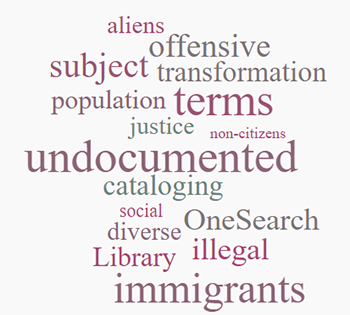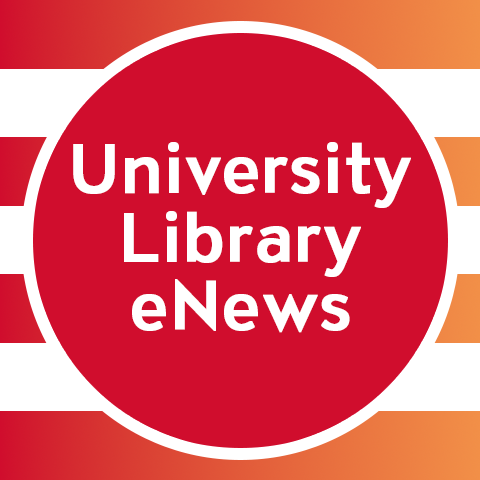Newsletter Edition: Spring 2020
Contributed by Elizabeth Altman
Ordinarily one might not find library subject headings particularly fascinating, but the Oviatt Library’s OneSearch discovery system has a new story to tell that radically changes the way students engage with information on critical topics. Thanks to the collaborative work of Luiz Mendes, chair of the the Library’s Collection Access and Management Systems department, and Israel Yanez, a cataloger at CSU Sacramento Library, in the display of certain library search results, illegal aliens has become undocumented immigrants.
The change was prompted by a resolution made by the American Library Association (ALA) that illegal aliens and related terms are dehumanizing, and should be changed in all search systems used by United States libraries. In 2016 the Library of Congress confirmed that the ALA resolution should be adopted into law, but this decision was subsequently blocked by the US Congressional Appropriations Committee.
Undaunted by this reversal, a committee formed within the ALA, the ALCTS Subject Access Committee (SAC) to consider alternatives to the offensive subject headings. SAC recommended replacing “illegal aliens” and related terms with “undocumented immigrants” and “non-citizens,” depending on context. In 2019, ALCTS surveyed libraries to find out which, if any, had acted on the earlier ALA resolution. This sparked a discussion within the 23-campus CSU Unified Library Management System (ULMS) Technical Services Working Group. Mendes and Yanez proposed a series of changes to the CSU Technical Services Open Forum in October 2019. Encouraged by feedback on the plan, they made a recommendation to the Council of Library Directors (COLD), which passed a resolution agreeing with the ALA resolution in early December.
The substitution of subject terms in OneSearch, the search system used by all 23 campuses of the CSU, was no trivial matter. All library systems in the United States use subject terms defined by the Library of Congress (LOC). These standardized “tags” (called metadata) are associated with a search system’s records of books, articles, and other items, and they help determine which results appear when you enter specific words in your search. LOC regularly revises subject terms to reflect contemporary cultural perception. For example, the term “African Americans” has been through several changes. You can find a summary of the LOC’s revision decisions on Summary Decisions from the Weekly Editorial Meeting.
Libraries generally avoid altering their subject terms at the local level, and in considering these specific changes, the ULMS working group had to be cautious not to open the door to wide-ranging substitutions. “There are still subject terms that some may find offensive,” says Mendes “for example, ‘women scientists’ [editor’s note: because there is no search term ‘men scientists’ ]. Since subject terms affect how the Library’s holdings are searched and discovered worldwide, all changes need to be weighed carefully. We wouldn’t have pursued this action if it had not already been recommended by the Library of Congress and the ALA.”

Possible practical strategies included (a) replacing offensive terms or (b) adding the more neutral terms alongside the offensive terms. Both had drawbacks. Deviating from the standard points of access by replacing the terms would mean you might search “illegal aliens” and receive a set of results completely different from what you would find in libraries outside the CSU Libraries system. Simply adding the neutral terms alongside would hardly solve the problem. Because of the way the record for each item in the system is processed before the user sees it -- a process called transformation -- a third possibility presented itself: masking the LOC term with an inoffensive alternative. Searches that used the standard LOC terms and those that used the substitution terms would yield the same results, but the offensive terms would not be displayed in the record themselves. This is the strategy they successfully implemented.
The results of this action were not immediately apparent, but the Library’s records now provide a more inclusive terminology that respects the identity of more of those who are likely to be using them. Because the Library serves a diverse population of students and faculty, and receives Title III funding as a Hispanic Serving Institution, we are now proudly supporting our mission by being responsive to social justice concerns through the language of our metadata. “Most of our students use the term ‘undocumented immigrants,’ so we expect this change will make OneSearch more useful to them,” says Mendes. The change is also in line with terms already used in several of our databases. Increased searches using the more neutral terms might put pressure on our remaining database vendors to include those terms; if they find they are getting searched less frequently because they are using outdated, offensive terms, they will likely be forced to change them.
Other institutions have contacted Israel Yanez to discuss making this change in their discovery systems. In December 2019, Yanez and Mendes received a commendation as Radical ChangeMakers from the CSU Coalition for Undocumented Student Success.
